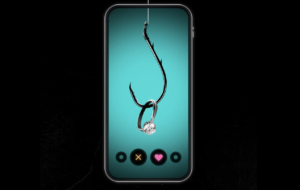For many of television’s most watched—and hated—families, money runs thicker than blood. The perverted, exploitative vacationers of The White Lotus (2021–) and the cutthroat 0.1-percenters like Succession’s (2018–23) Roy family are just two standouts in a slew of recent HBO successes. Given their resounding critical and audience acclaim, it was only a matter of time before these shows spawned copycats. Trying its hand at the formula, Peacock’s Apples Never Fall (2024) follows the Delaneys of West Palm Beach, Florida as four siblings and their father Stan (Sam Neill) search for missing mother and wife Joy Delaney (Annette Bening). The children are not exactly cold or ruthless, and they certainly wouldn’t kill to meet their goals (although some of them suspect that their father might); instead, they emulate the white liberal families of HBO’s Big Little Lies (BLL, 2017–), indulging decorum to circumvent venomous gossips and papering over their deep dysfunction.
It’s not a coincidence, then, that the source materials for Apples and BLL were both penned by author Liane Moriarty. While the resemblance is clear, it’s not exact. Somehow, stakes in the Peacock original never feel that high, despite centering around a missing persons case and potential murder. Maybe it’s because Apples’ conflict remains contained to one family whose cracks never seem to shatter them, or because it’s a self-serious drama punctuated by the occasional witticism rather than woven through with satire. Whatever the cause, the newest Moriarty adaptation relies more on character arcs than a convoluted, breakneck plot, placing the onus of intrigue on the cast and dialogue.
The series opens at a retirement party for Stan and Joy, former tennis pros who finally sold the Delaney Tennis Academy where they worked as co-owners and coaches for decades. Stan is revealed to be an especially cutthroat coach and father who hoped to see one of his own go pro, but the closest he got was with his prodigious student Harry Haddad (Giles Matthey), who became Grand Slam champ after his abrupt departure from the academy. The competitive dynamic of the Delaney family—magnified by Stan’s disappointment that none of his kids followed in his professional footsteps—forces Joy into playing peacemaker for her husband and children. Internal resentments are palpable but rarely voiced until Joy goes missing: the eldest two suspect foul play from their father, while their younger siblings maintain Stan’s innocence and deny that he exhibited any abusive behaviors during their upbringing.
While the writing lacks depth at times—the metaphor of “finding Joy” in this broken family is not a subtle one—Apples still manages to create a compelling story around its central mystery. Told between two timelines, the weeks following the Delaneys’ retirement and seven months later when Joy goes missing, Apples sees the children and Stan reflect on their family history and ultimate neglect of Joy. She had hoped her retirement would help the family come together by enticing more visits from her kids and bonding with her husband, but quickly learns that her children are less than enthusiastic about this prospect, instead getting caught up in their work and personal lives.
It’s easy to see why Joy, looking for somewhere to place her maternal energy, was incredibly welcoming when a young, unassuming woman named Savannah (Georgia Flood) showed up on her doorstep days after her retirement. Claiming to have fled domestic abuse, Savannah accepts Joy’s invitation for an indefinite stay with the Delaneys. But the kids, suspicious of the stranger from her arrival, try getting to the bottom of Savannah’s story when Joy goes missing, believing it’ll lead to their mother. The seven-months-ago plotline advances weeks while the present crawls one day at a time, allowing the post-retirement tensions to catch up with the search for Joy. Collapsing the two timelines brilliantly increases the narrative tension—we’re drawn more and more into each character’s interiority, witnessing how past wrongs by and against them precipitate developments in the case of Joy’s disappearance.
The well-developed backstories lend depth to each family member, allowing the audience to feel sympathy for these otherwise archetypal characters. The oldest sibling, Troy (Jake Lacy), is a wealthy Stanford grad and venture capitalist who blames Stan’s emotional (and sometimes physical) abuse for the rifts in their family; Amy (Alison Brie), lives as the wayward, granola life coach who didn’t finish her bachelor’s degree and became the family’s professional laughing stock; Logan (Conor Merrigan-Turner), is closest to Stan but disappoints him by tending to boats at the marina instead of taking over the Academy; and Brooke (Essie Randles) is a physical therapist who exhibits classic youngest child tendencies—idolizing her parents and being achingly spoiled (as the youngest myself, even I’m off-put by her brattiness). Everyone has their own vices, tells lies, and hurls jabs at one another, but it doesn’t take a psychologist to identify the source of the family rot: Stan.
It’s hard to believe that they were all parented by the same people, and because of their stark differences, the sibling ensemble initially feels forced. But as the characters’ layers are revealed and the actors fall more into sync, it becomes clear that the discord was at least somewhat intentional, communicating that Stan’s tennis-dependent expressions of love meant the four children experienced vastly different upbringings—his pro hopefuls, Logan and Brooke, got all of his already scant affection. Turner’s portrayal of Logan begins as flat and apathetic, but he grows into the role—and gets better at masking his Australian accent—as his character self-actualizes, noticing fractures in his picture-perfect idolization of Stan. Brie’s comedy background feels incongruous with Apples’ tone, which initially takes itself way too seriously despite having all of the fodder for a sardonic “eat the rich” commentary á la its HBO counterparts. Luckily, the show gives way to these impulses around episode three, which uncoincidentally spotlights Amy’s backstory and adds much-needed dynamism to the family’s many squabbles. Randles isn’t given much to work with in terms of character development, but despite being the least likable, her portrayal of Brooke is consistently convincing.
The real standout is Lacy’s Troy, a multi-faceted upgrade of his one-note douchebag Shane from The White Lotus. Though both are white-collar hotshots with a penchant for luxury, we at least come to understand that Troy is a product of the environment he was raised in. It’s not revolutionary that his desire to prove himself to Stan motivates him toward financial success, but what is original is Troy’s steadfastness in protecting his siblings from their father, even the ones who continually side with Stan. Lacy relays this turmoil with a subtlety that cuts to the heart, but he also keeps up with Brie’s comedic timing in their quippy exchanges, invoking the sweet goofballs he played on both The Office (2012–13) and Lena Dunham’s Girls (2015–16).
At times, Apples is clunky and awkward, especially in moments that rely on Joy or Stan to make an emotional appeal; and the tennis-heavy scenes, meant to depict the Delaneys’ reliance on the sport to bond, get bogged down by jargon in an already cautiously paced show. Apples’ seven episodes, the first titled “The Delaneys” and the rest each named after one family member, handle each character with care through flashbacks and long exchanges of dialogue, contributing to its slower plot progression. But the series slams on the gas halfway through episode six, “Stan,” to zoom past the finish line—while I appreciate that the answers were not dragged out, because of the show’s methodical nature, an episode titled “Savannah” about this honorary Delaney could have been a great twist.
Despite its flaws and missed opportunities, Apples is a worthwhile watch if you have a weekend to kill and are looking for a mild-mannered thriller. While it doesn’t live up to the exemplary adaptation of Big Little Lies, this series is still a juicy bite from the Moriarty tree.




